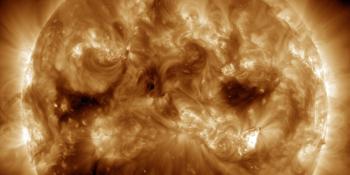Vaata neljapäev, 28 märts 2024 arhiivi
Daily bulletin on solar and geomagnetic activity from the SIDC
Välja antud: 2024 Mar 28 1234 UTC
SIDC Forecast
Päikesepursked ehk loited
M-class flares expected (probability >=50%)
Geomagnetism
Quiet (A<20 and K<4)
Päikese prootonid
Quiet
| 10cm flux | Ap | |
|---|---|---|
| 28 Mar 2024 | 170 | 006 |
| 29 Mar 2024 | 166 | 005 |
| 30 Mar 2024 | 155 | 008 |
Solar Active Regions and flaring
The solar flaring activity was moderate with one M-class flare recorded. The largest flare of the period was an M7.1 flare with peak time 06:29 UTC March 28. This flare originated from Catania region 22 (NOAA AR 3615), which is the largest and most complex region on disk (Beta-Gamma-Delta) but has begun to decay slightly. This region also produced much of the C-class flaring activity. Catania region 30 and 32 (NOAA ARs 3623 and 3622) decayed into plage regions The remaining regions on disk are simple and were either stable or in decay. The solar flaring activity is expected to be at moderate levels over the next 24 hours with C-class flares expected, M-class flares likely and a low probability for an X-class flare.
Krooniaine massiline väljavool
No Earth directed Coronal Mass Ejections (CMEs) have been detected in the available coronagraph imagery.
Krooniauk
Two small positive polarity coronal holes one near the equator and one in the southern hemisphere began to cross the central meridian on March 27.
Päikesetuul
The solar wind speed gradually decreased from values around 500 km/s to around 420 km/s due to the waning influence of the ICME which arrived on March 24. The interplanetary magnetic field ranged between 0 and 5 nT. The Bz component reached a minimum value of -2 nT. The interplanetary magnetic field phi angle was predominantly in the positive sector. The solar wind speed is expected to reflect slow solar wind conditions on March 28 and 29, enhancements due to the solar wind associated with the positive coronal holes may be expected from March 30.
Geomagnetism
Geomagnetic conditions were at quiet levels (NOAA Kp 2 and Local K Bel 2). Geomagnetic conditions are expected to be at quiet to unsettled levels on March 28 to March 30.
Proton flux levels
Over the past 24 hours the greater than 10 MeV GOES proton flux was still slightly enhanced but remained below the 10pfu threshold. The proton flux is expected to continue to decrease and remain below 10 Mev threshold over the next 24 hours.
Electron fluxes at geostationary orbit
The greater than 2 MeV electron flux remained below the 1000 pfu threshold as measured by GOES 16. It is expected to exceed this threshold over the next days. The 24-hour electron fluence was at nominal levels. The electron fluence is expected to increase to normal to moderate levels over the next day.
Today's estimated international sunspot number (ISN): 097, based on 14 stations.Solar indices for 27 Mar 2024
| Wolf number Catania | /// |
| 10cm solar flux | 175 |
| AK Chambon La Forêt | 008 |
| AK Wingst | 006 |
| Estimated Ap | 006 |
| Estimated international sunspot number | 115 - Based on 19 stations |
Noticeable events summary
| Day | Begin | Max | Lõpp | Loc | Strength | OP | 10cm | Catania/NOAA | Radio burst types |
|---|---|---|---|---|---|---|---|---|---|
| 28 | 0616 | 0629 | 0636 | S16W55 | M7.1 | 1N | 22/3615 |
Provided by the Solar Influences Data analysis Center© - SIDC - Processed by SpaceWeatherLive
Kõik ajad UTC-s
<< Mine igapäevase ülevaate lehele
Viimane uudis
Viimane foorumi postitus
Toeta SpaceWeatherLive.com-i!
Paljud inimesed külastavad SpaceWeatherLive lehte selleks, et jälgida, mis toimub Päikesel või, kas on oodata virmalisi. Suurema liiklusega on serveri koormus ning maksumus kõrgem. Kui sulle meeldib see, mida me sinu heaks teeme, siis saad sa sellele ka ise natukene kaasa aidata, annetades selle lehe käigus hoidmise ja arendamise heaks. Ette tänades SpeaceWeatherLive meeskond!

Fakte kosmose ilmast
| Viimane X-loide | 28/03/2025 | X1.1 |
| Viimane M-loide | 01/04/2025 | M2.5 |
| Viimane geomagnetiline torm | 27/03/2025 | Kp5 (G1) |
| Plekivabasid päevi | |
|---|---|
| Viimane päikese plekivaba päev | 08/06/2022 |
| Kuu keskmine päikeseplekkide arv | |
|---|---|
| veebruar 2025 | 154.6 +17.6 |
| aprill 2025 | 147 -7.6 |
| Viimased 30 päeva | 128.8 -21.8 |


